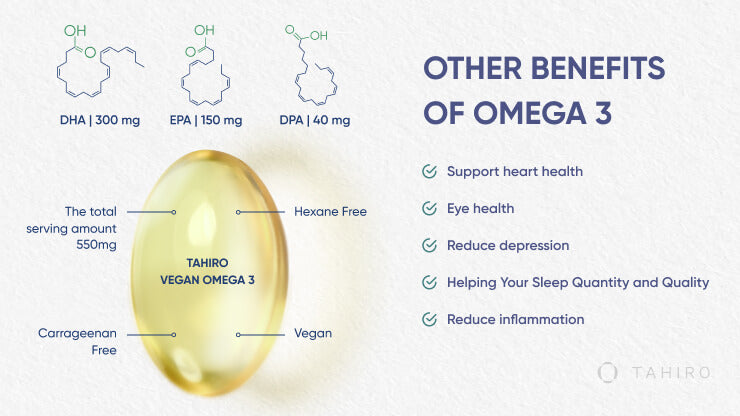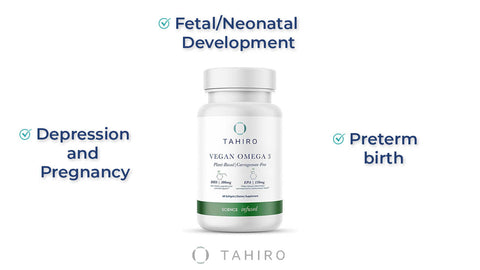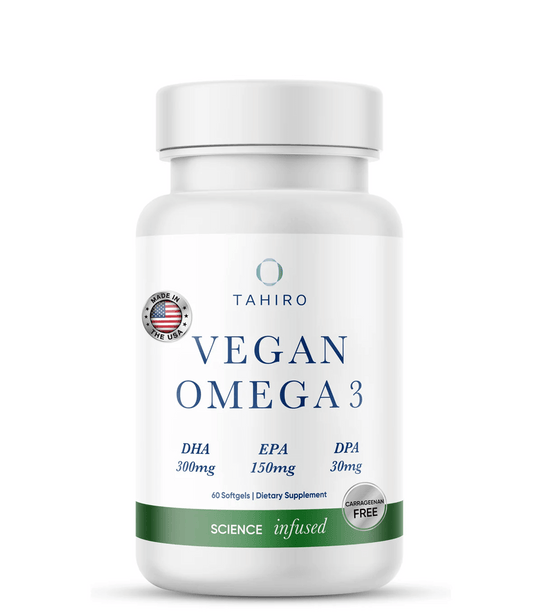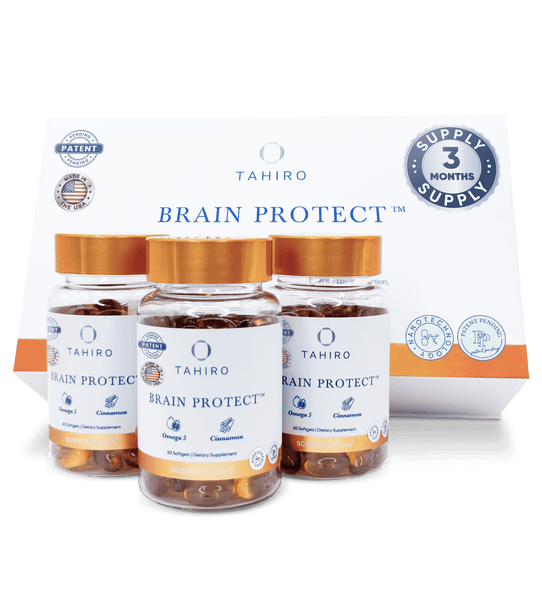Omega 3 fatty acids are essential during pregnancy for both the expecting mother and the baby’s well being. Omega 3 aids in the development of the baby’s brain and eyes, and decreases the risk of preterm birth. Additionally, Omega 3 may help prevent postpartum depression in mothers and support their overall health.
Omega-3 fatty acids: what are they?
Omega 3 fatty acids are a group of healthy polyunsaturated fats that offer numerous health benefits including heart and brain health, reducing inflammation, supporting pregnancy and maintaining overall health. The main sources of omega 3s are foods and supplements.
The main types of omega 3 fatty acids: A-linolenic acid (ALA), eicosapentaenoic acid (EPA), and docosahexaenoic acid (DHA). ALA is found mainly in vegan sources like chia seeds, flax and seaweed. ALA converts into the EPA and DHA. DHA and EPA are primarily found in fatty fish and algal oil and are best known for delivering the most health benefits associated with omega 3 fatty acids.
The human body does not efficiently convert ALA into EPA and DHA and thus the animal sources of omega 3 had been the preferred choice to create supplements for a long time. Nevertheless, some women may avoid animal sources due to fish or seafood allergies, a vegan/vegetarian lifestyle or simply prefer a sustainable source of omega 3 supplements.
Scientists welcomed a new player in the world of omega 3 essential fatty acids: algal oil. Researchers discovered that algal oil is a rich source of DHA , and the DHA from algal oil has comparable bioavailability (absorption) to cooked salmon [1]. A clinical study conducted in lactating women concluded that DHA supplementation derived from algal oil significantly increased breast milk concentration of DHA omega 3 compared with the control group [2].
Algal oil is also a source of omega 3 fatty acid called DPA (Docosapentaenoic acid). Also found in breast milk, DPA shares similarities with DHA and EPA. Preliminary studies suggest DPA may even have more benefits than EPA, especially when it comes to lowering inflammation. Furthermore, some human studies found that higher levels of DPA correlate with lower risk of heart diseases [3]. The ratio between omega 3 and omega 6 fatty acids is also important for overall health and wellbeing.
Why is Omega-3 Important During Pregnancy?
Omega 3s are often recommended during pregnancy as they are essential for both the expecting mother and the baby. Omega 3 supplements are often needed, as mothers limit the consumption of fish and seafood due to concerns about mercury and other contaminants [4]. EPA is best known for its role in heart health, the immune system function, and inflammatory response, while DHA helps maintain the health of the brain, eyes, and nervous system during pregnancy [5].
Omega 3 and Pregnancy. The Health Benefits of Consuming Omega-3 During Pregnancy
- Fetal/Neonatal Development. Research studies found that consumption of omega 3 during pregnancy is essential for fetal brain development, including better performance in developmental milestones and language development.
- Preterm birth. Studies found that a high ratio omega 6 to omega 3 leads to increased inflammation, early labor and preterm labor. Adding more EPA to the diet helps reduce the inflammation and prevent preterm labor. Some studies found that omega 3 supplementation may reduce the rate of preterm birth or increase the average length or the gestation.
- Depression and Pregnancy. Maternal depression not only affects the mother but can also affect the baby’s cognitive development, behavior and child attachment. Scientists found that mothers who consume omega 3 during pregnancy have lower risk to develop postpartum depression [4].
Other Benefits

-
Support heart health: The most robust scientific evidence for omega 3 supports their role in promoting cardiovascular health. Based on research, omega 3s significantly decrease the risk of sudden death or death from all causes. Furthermore, omega 3 fatty acids help manage high cholesterol levels and high blood pressure, which are risk factors for developing heart diseases. The typical daily doses of omega 3 for heart protection is 1 g of omega 3 (EPA and DHA combined) [6].
-
Eye health: Omega 3s are essential for eye health. DHA may also help manage eye diseases associated with atherosclerosis (hardening of the arteries that supply blood to the retina) [7].
Optometrists recommend omega 3 supplements for overall eye health and specifically for conditions like age-related macular degeneration and dry eye disease [8].
-
Reduce depression: Omega 3 supplements may help improve depression. The anti depressant effects seem to be influenced by the ratio between EPA and DHA. .
A 2019 review/meta analysis concluded there is evidence that omega 3 (pure, 100% EPA and EPA based supplements containing at least 60% EPA have beneficial effects on depression [9].
-
Helping Your Sleep Quantity and Quality: A healthy sleep is essential to overall health. Preliminary studies suggest that EPA and DHA regulate serotonin, a brain chemical involved in sleep wake cycle. Other studies found that high levels of DHA in plasma were also found to be associated with longer sleep duration and improved sleep quality [10].
-
Reduce inflammation: Inflammation is a hallmark of many chronic illnesses including heart diseases, depression, cancer and autoimmune diseases. Scientists found omega 3 supplements have anti inflammatory qualities and offer significant benefits ranging from symptom improvement to decrease the need for antiinflammatory drugs [11].
Which Foods Contain Omega-3?
Plant based sources of omega 3 ALA that are a rich source of ALA include flaxseed, hemp seeds and chia seeds. Cold water fatty fish are great sources of animal omega 3s [12].
How Do I Get Enough Omega-3s?
Ensuring an adequate intake of omega 3s can be achieved through consuming omega 3 rich foods and taking supplements
What Omega-3 Supplement Is Best For Pregnancy?
Supplements that contain at least 200 mg DHA per serving are recommended during pregnancy [13].
Is it safe to take vegetarian omega-3 supplements during pregnancy?
Scientists did not find signs of neurotoxicity following supplementation with omega-3 from algae (algal oil) [14, 15]. In human studies , algal oil has been tested in lactating women [16]. Choose supplements from reputable brands to ensure safety.







